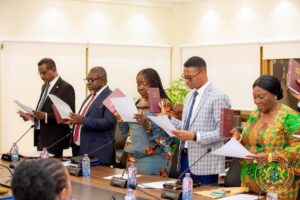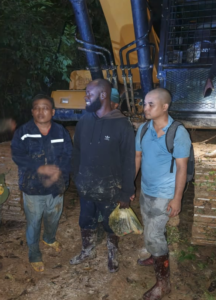
PHOTO: Determined faces of women demanding a mano-a-mano showdown, calling for the withdrawal of troops.
Tensions in Ghana’s Upper East Region have escalated sharply following the circulation of a series of viral videos in which three women and a man—believed to be aligned with one faction in the protracted Bawku chieftaincy conflict—openly call for the withdrawal of state security forces to allow what they describe as a “mano-a-mano” resolution of the dispute.
The videos, widely shared on social media, feature emotionally charged appeals to President John Mahama and the Inspector-General of Police, urging the recall of police and military personnel currently deployed to maintain peace in the conflict-prone municipality. The individuals argue that the presence of security forces is obstructing a definitive resolution between rival factions.
“There is no point in peace talks anymore,” one woman says. “Withdraw the military and let us handle it ourselves. Neither side is willing to concede. This can only end if we fight.”
Another woman, challenging perceptions of strength and courage between the opposing sides, said: “If you doubt us, remove the soldiers and let’s meet woman to woman.”
In another video, a man dressed in traditional regalia and presenting himself as a local authority, proposed a drastically reduced security presence—30 Formed Police Unit officers and 20 soldiers with armoured vehicles—arguing that the current deployment puts peacekeepers at undue risk.
“Why should a police officer die for people who do not want peace?” he asked. “If the Kusasis attempt an ambush, they will be met with a response that will shock the nation.”
Alternatively, he proposed relocating troops to the nearby town of Zibila and granting the warring parties 24 hours to resolve their differences unaided.
The remarks have sparked concern among civil society groups, peacebuilding organisations, and national security analysts, many of whom view the calls as dangerously inflammatory. Bawku, long gripped by a chieftaincy dispute between the Kusasi and Mamprusi ethnic groups, has experienced sporadic violence despite repeated interventions from state and traditional authorities.
In an apparent attempt to dial down tensions, the Kusaug Youth Association has issued a statement reaffirming its commitment to peace and ongoing security efforts.
“We remain committed to peace,” the group said. “Our priority is to prevent further bloodshed and contribute to long-term reconciliation.”
The Inspector-General of Police, who recently visited Bawku as part of de-escalation efforts, has yet to issue a formal response to the video appeals. However, sources within the national security apparatus confirm the situation is under active surveillance.
Though recent security deployments have helped suppress large-scale violence, analysts warn that a military solution alone cannot resolve the underlying causes of the conflict. At its root are longstanding grievances over chieftaincy succession and land ownership, issues that continue to divide the community and frustrate reconciliation efforts.
As rhetoric on both sides becomes increasingly confrontational, the government faces a delicate task: balancing immediate security with the need for a sustainable political and cultural resolution, before another round of unrest is sparked in a region already on edge.






